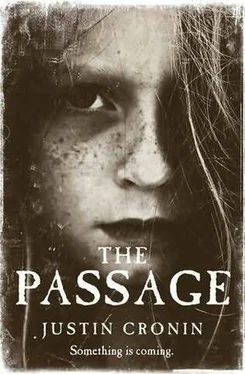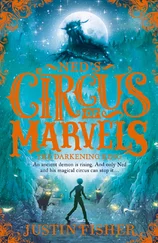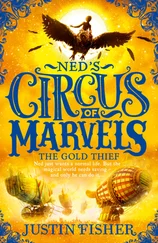“Aw, come on,” Paulson whined. “The dude’s mental or something. Anyone can see that.”
Richards felt the last of his patience run out of him like the last drops of water from a leaky bucket. The hell with it. Without speaking he withdrew his weapon from its spot at the base of his spine. A long-slide Springfield.45 that he used mostly for show: a huge gun, a hilarious gun. But despite its bulk, it rode comfortably, and in the predawn light of the loading area, its titanium casing radiated with the menace of its perfect mechanical efficiency. In a single motion Richards popped the safety with his thumb and chambered a round, grasping Paulson by the belt buckle to pull him close, then shoved the muzzle into the soft V of flesh below his chin.
“Don’t you understand,” Richards said quietly, “that I’d shoot you right here just to put a smile on this man’s face?”
Paulson’s body had gone rigid. He was trying to cast his eyes toward Davis, or maybe the security detail, but was facing the wrong way. “What the fuck?” he sputtered against the clenching muscles of his throat. He swallowed hard, his Adam’s apple bobbing up against the muzzle of the gun. “I’m cool, I’m cool.”
“Anthony,” Richards said, his eyes still fixed on Paulson’s, “it’s your call, my friend. You tell me. Is he cool?”
From the van, a long silence. Then, quietly: “’Sall right. He cool.”
“You’re sure now? Because if he isn’t, I want you to tell me. You get the last word on this.”
Another pause. “He cool.”
“You hear that?” Richards said to Paulson. He released the soldier’s belt and pulled his weapon away. “The man says you’re cool.”
Paulson looked like he was about to cry for his mama. On the loading dock, the security detail burst out laughing.
“The key,” Richards said.
Paulson reached into his belt and passed it to Richards. His hands were trembling; his breath smelled like vomit.
“Go on now,” Richards said. He shot a look at Davis, holding his pile of comic books. “You too, junior. The both of you, get the fuck out of here.”
They scrambled off into the snow. In the few minutes since the van had pulled up, the sun had lifted from behind the mountains, giving the air a pale glow. Richards bent into the van and undid Carter’s shackles.
“You okay? Those boys hurt you anywhere?”
Carter rubbed his damp face. “They didn’t mean nothing.” He swung his feet from the bench and lowered himself stiffly onto the ground. He blinked and looked around. “They gone?”
Richards said they were.
“What this place?”
“Fair question.” Richards nodded. “All in time. You hungry, Anthony?”
“They fed me. McDonald’s.” Carter’s eyes found the security detail, standing on the dock above them. His expression told Richards nothing. “What about them?” he asked.
“They’re here for you. You’re the guest of honor, Anthony.”
Carter narrowed his eyes at Richards. “You really shoot that guy if I’d said to?”
Something about Carter made him think of Sykes, standing in his office with that lost look on his face, asking him if they were friends.
“What do you think? You think I would have?”
“I wouldn’t know what to think.”
“Well, just between us, no. I wouldn’t have. I was just fooling with him.”
“I thought you was.” Carter’s face broke into a grin. “Thought it was funny, though. You doing him like you did.” He shook his head, laughing a little, and looked around again. “What happen now?”
“What happens now,” Richards said, “is we get you inside, where it’s warm.”
By nightfall they were fifty miles past Oklahoma City, hurtling west across the open prairie toward a wall of spring thunderheads ascending from the horizon like a bank of blooming flowers in a time-lapse video. Doyle was fast asleep in the Tahoe’s passenger seat, his head wedged into the space between the headrest and the window, cushioned against the bumps in the road by a folded jacket. At times like this, Wolgast found himself envying Doyle, his powers of oblivion. He could turn his own lights off like a ten-year-old, put his head down and sleep virtually anywhere. Wolgast’s fatigue was deep; he knew the smart thing would have been to pull off and change places, catch a few winks himself. But he had driven the whole distance from Memphis, and the feel of the wheel in his hands was the only thing that made him think he still had a card to play.
Since his call to Sykes, their only contact had taken place in a truck-stop parking lot outside Little Rock, where a field agent had met them with an envelope of cash-three thousand dollars, all in twenties and fifties-and a fresh vehicle, a plain-wrapper Bureau sedan. But by then Wolgast had decided he liked the Tahoe and wanted to keep it. He liked its big, muscular eight-cylinder engine and swishy steering and bouncy suspension. He hadn’t driven anything like it in years. It seemed a pity to send a vehicle like that into the crusher, and when the agent offered him the keys to the sedan, he waved them off imperiously, without a second thought.
“Is there anything on the wires about us?” he’d asked the agent-a fresh recruit with a face pink as a slice of ham.
The agent frowned with confusion. “I don’t know anything about it.”
Wolgast considered this. “Good,” he said finally. “You’ll want to keep it that way.”
The agent had then taken him around to the sedan’s trunk, which sprang open to meet them. Inside was the black nylon duffel bag he hadn’t asked for but still expected.
“Keep it,” he said.
“You sure? I’m supposed to give it to you.”
Wolgast shifted his gaze toward the Tahoe, parked at the edge of the lot between two dozing semis. Through the rear window, he could see Doyle but not the girl, who was lying down on the backseat. He really wanted to get moving; whatever else was true, sitting still was not an option. As for the bag, maybe he needed it and maybe he didn’t. But the decision to leave it behind felt right.
“Tell the office anything you want,” he said. “What I could really use is some coloring books.”
“I’m sorry?”
Wolgast would have laughed if he were in the mood. He put his palm on the lid of the trunk and pushed it closed. “Never mind,” he said.
The bag held guns, of course, and ammunition, and maybe a couple of armored vests. Probably there’d be one in there for the girl, too; there was a company in Ohio that was making them for kids now, since that thing in Minneapolis. Wolgast had caught a segment about it on the Today show. They were actually making a Zylon snapsuit for infants. What a world, he thought.
Now, Little Rock six hours behind them, he was still glad he’d declined the bag. Whatever happened, happened; part of him wanted to be stopped. Outside Little Rock, he’d actually let the speedometer drift up to eighty, only dimly aware of what he was doing-that he was daring some state trooper or even a local cop sitting behind a billboard to call the whole thing off. But then Doyle had told him to slow down- Yo, chief, shouldn’t you ease off the pedal a bit? -and his mind had snapped back into focus. He’d actually been playing out the scene in his mind: the flashing lights and a single, tart bleep of the siren; pulling the truck over to the side and placing his open hands on the wheel, lifting his eyes to the rearview to watch the officer calling in the plate number on his radio. Two grown men and a minor in a vehicle with temporary Tennessee tags: it wouldn’t take long to put the whole thing together, to connect them to the nun and the zoo. Whenever he imagined the scene, he couldn’t see beyond that moment, the cop with one hand on his mike, the other resting on the butt of his weapon. What would Sykes do? Would he say he’d ever even heard of them? No, he and Doyle would go into the shredder, just like Anthony Carter.
Читать дальше












